|
|
|
Sort Order |
|
|
|
Items / Page
|
|
|
|
|
|
|
| Srl | Item |
| 1 |
ID:
140746
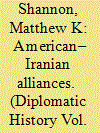

|
|
|
|
|
| Summary/Abstract |
The tension between “modernization” and “rights” defined the relationship between Americans and Iranians from the 1950s through the 1970s. The dynamic interplay between these two transnational currents is best understood through the lens of international education. U.S. policy makers envisaged Western-educated Iranians as the bastion of pro-Americanism required to provide the cultural underpinnings of the Washington–Tehran alliance. But the influx of Iranian students to American campuses globalized U.S. institutions of higher education and, in the process, produced an alternate alliance of Iranian youths and progressive Americans that rejected Shah Mohammad Reza Pahlavi’s authoritarian model of development, called for the realization of human rights in Iran, and revealed the contradictions inherent in a U.S. strategy that promoted student exchange while at the same time supporting the shah as an agent of modernization and anti-Communism.
|
|
|
|
|
|
|
|
|
|
|
|
|
|
|
|
| 2 |
ID:
165207
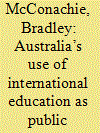

|
|
|
|
|
| Summary/Abstract |
This research utilises expert interviews to investigate why the Australian Government funds the New Colombo Plan (NCP) and the Australian Studies Centres (ASCs) as public diplomacy in China. The ASCs have grown with no increase in funding, however, the academics view themselves as facilitators of Australian Studies not an arm of public diplomacy, despite their work contributing toward positive Australia-China relations. Evaluating the efficacy of the ASC’s contribution to public diplomacy is fraught with risk. Some suggest that political activism may backfire when governments explicitly outline their soft power strategies. As the NCP has no longitudinal measurements, this research is an initial review of short-term achievements. However, the external survey with 16% return rate, and just over 50% response rate indicating an intention to act as ambassadors for the program, requires review by the funding department. The opportunity for the Government to send a positive message to China and the strong people-to-people networks fostered by the two programs’ participants have the potential to influence the nexus between Australian foreign policy, international education as public diplomacy and public engagement with foreign policy. This alone, should be sufficient to justify continued funding, or in the case of the ASCs, increased funding.
|
|
|
|
|
|
|
|
|
|
|
|
|
|
|
|
| 3 |
ID:
143523
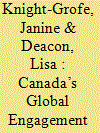

|
|
|
|
|
| Summary/Abstract |
A key strength of Canada’s international education engagement is its openness to a multi-faceted exchange of knowledge and ideas across borders. But while Canada excels and continues to grow in international research collaboration, institutional partnerships, and inbound student mobility, its performance in the realm of outbound mobility is less impressive: a mere 3.1 percent of university students participate annually. Participation of college and high school students is even lower. This paper looks at recent developments in Canada and six other countries and regions to compare approaches regarding international learning experiences. It first examines the Canadian situation, then the various rationales for a high degree of participation in education abroad, followed by a review of international approaches. It concludes that Canada needs to redouble its efforts and investments or young Canadians will be less equipped to participate than their peers from other countries.
|
|
|
|
|
|
|
|
|
|
|
|
|
|
|
|
| 4 |
ID:
117731
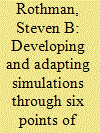

|
|
|
|
|
| Publication |
2012.
|
| Summary/Abstract |
The essay describes a new way to evaluate variation among simulations through six distinct categories. The six points involve the content of the simulation, the integration of the simulation with other aspects of the course, the length of a simulation, the strictness of rules, the interaction among students during the simulation, and assessment techniques. The essay assesses the benefits and costs of the simulation and course design through student feedback and instructor evaluation. In addition, the essay uses these six points of variation as a framework to explain a sample simulation integrated with course objectives, goals, lecture material, two short research essays, and other class activities designed to teach game theory applied to current international problems. The simulation uses current world issues to help students incorporate class content, game theoretic modeling, and strategic interaction into an international negotiation conducted in class.
|
|
|
|
|
|
|
|
|
|
|
|
|
|
|
|
| 5 |
ID:
188639
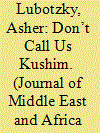

|
|
|
|
|
| Summary/Abstract |
During the 1960s, several hundreds of African students attended long-term academic or vocational programs in Israel. For Israel, offering higher education to Africans was considered a way to strengthen its influence in decolonizing Africa, while for African states, it was a means to gain vital technical expertise and reduce reliance on ex-colonial powers or the Cold War superpowers. African international students, however, were not merely pawns in this larger international political game. Responding to everyday racism and influenced by radical and Pan-Africanist ideas of the turbulent sixties, these students became active participants and commentators within Israeli society. They employed diverse strategies to promote anti-racist and anti-colonial causes, engaging in political activism at levels that were uncommon in the Israeli student social scene. By doing so, African students in Israel contested local prejudices about Africa and Africans and taught the hosting society important lessons on political awareness, broad-mindedness, acceptance, and racial tolerance. This history tells of understudied aspects of the global Black-Jewish relations in the 1960s. It also provides a novel perspective on Israeli society – one that surpasses the well-discussed Jewish-Arab or Ashkenazi-Mizrahi divisions – and contributes to the scholarly understanding of the meanings and manifestations of Blackness in Israel.
|
|
|
|
|
|
|
|
|
|
|
|
|
|
|
|
| 6 |
ID:
119945
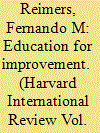

|
|
|
| 7 |
ID:
190829
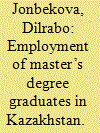

|
|
|
|
|
| Summary/Abstract |
This article explores the employment experiences of government scholarship graduates from one master’s degree programme at a flagship university in Kazakhstan. Analysis of interviews with graduates of a master’s degree programme designed in response to a national policy agenda shows that graduates encountered numerous challenges transitioning from university to work despite obtaining a degree from a top Kazakhstani university. The key challenges included limited employment opportunities, hostile attitudes toward younger graduates, difficult working conditions and employers’ misunderstanding of the new master’s programmes. We argue that despite significant government financial investment in education, a weak enabling support system hinders graduates’ career advancement and results in job mismatch and underutilization of skills. We suggest that policymakers need to shift debates on human capital development and graduate employability from supply-side factors to a more comprehensive model in which graduate employment is supported through the collaboration of the higher education system, industry, policymakers and graduates themselves.
|
|
|
|
|
|
|
|
|
|
|
|
|
|
|
|
| 8 |
ID:
127063
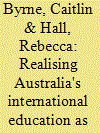

|
|
|
|
|
| Publication |
2013.
|
| Summary/Abstract |
Australia's international education serves as public diplomacy, essentially engaging and influencing public audiences in ways that progress Australian foreign policy priorities and national interests. The multidimensional and increasingly globalised nature of international education presents enormous opportunity for vital exchange and interactions between and with students, academics and communities via onshore and offshore modes of delivery. Positive experiences of student mobility and the development of intellectual, commercial and social relationships can build upon a nation's reputation, and enhance the ability of that nation to participate in and influence regional or global outcomes. This is ultimately the essence of soft power. While Australia has made significant commercial gains through international education, it has fallen short of realising the soft power potential inherent in the volume and depth of interactions, relationships and achievements resulting from it, particularly in the Asian region, where Australia's international education sector continues to be most active. This article argues that there is a soft power benefit in recognising international education as public diplomacy, though acknowledges that challenges exist in connecting the soft power aspirations to reality. Findings suggest that there is room for more coherent public diplomacy leadership and inter-agency coordination, improved evaluation and expanded dialogue both within the sector and the broader community.
|
|
|
|
|
|
|
|
|
|
|
|
|
|
|
|
| 9 |
ID:
119942
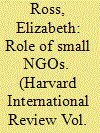

|
|
|
| 10 |
ID:
158698
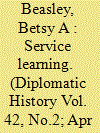

|
|
|
|
|
| Summary/Abstract |
During the Cold War, oil and oilfield services companies recruited international students to study engineering and business in Houston. Oilfield services executives used education to present their new global corporate reach as benevolent and nonthreatening for both American workers and citizens of oil-rich nations in a moment of post-colonial upheaval.
|
|
|
|
|
|
|
|
|
|
|
|
|
|
|
|
| 11 |
ID:
159854
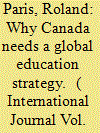

|
|
|
|
|
| Summary/Abstract |
Based on the report of the Study Group on Global Education, this article explains why Canada needs a national strategy aimed at significantly increasing the number of Canadian post-secondary students going abroad for study and work-integrated learning experiences. International education may once have been viewed as an optional luxury. Now it must be seen as a vital tool to equip young Canadians – and Canada – to succeed in a more complex and competitive world.
|
|
|
|
|
|
|
|
|
|
|
|
|
|
|
|
| 12 |
ID:
131871
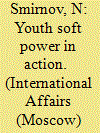

|
|
|
|
|
| Publication |
2014.
|
| Summary/Abstract |
SINCE THE BEGINNING of time, young people have been the most receptive to new ideas, views and concepts. For example, students getting their education abroad, in addition to gaining specialized knowledge, learn other languages, absorb different cultures and meet new friends there. Returning to their own countries, very many of them become the most effective champions of the policy and culture of the country where they studied.
|
|
|
|
|
|
|
|
|
|
|
|
|
|
|
|
|
|
|
|
|